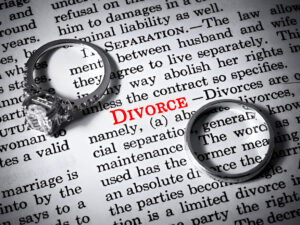How Divorce Settlements Influence Bankruptcy Filings in Texas

Why Are Divorce and Bankruptcy Often Linked?
Going through a divorce is emotionally taxing and financially overwhelming. When couples split, dividing assets and debts can create financial instability, prompting many Texans to consider bankruptcy.
What Happens to Debts After a Divorce in Texas?
How Are Debts Divided?
In Texas, a community property state, debts incurred during the marriage are typically split equally between spouses, regardless of who made the purchases or signed the loan agreements. This division can make it difficult for either party to meet their obligations post-divorce, especially if one spouse is left with a significant portion of shared debt.
Can Divorce Settlements Cause Bankruptcy?
Yes, the financial burden of spousal support, child support, or uneven debt division often pushes one or both parties into bankruptcy. Key reasons include:
- Legal Costs
- Loss of Income
- Debt Responsibility
(Learn more about community property laws in Texas from TexasLawHelp.org)
How Do Bankruptcy Filings Work in Texas After a Divorce?
Chapter 7 Bankruptcy and Divorce
Chapter 7 bankruptcy allows individuals to discharge unsecured debts like credit cards or medical bills quickly. It’s often the preferred option for divorced individuals facing significant debt.
- Bankruptcy does not discharge child support or spousal maintenance obligations.
- Texas exemptions protect certain assets, making it easier to rebuild financially after divorce.
Chapter 13 Bankruptcy and Divorce
Chapter 13 bankruptcy restructures debt into a repayment plan, which can be helpful for managing court-ordered obligations.
- Allows repayment over 3–5 years while keeping assets.
- Requires a stable income, which may be difficult post-divorce.
(Learn more about bankruptcy options from the United States Courts)
FAQs About Divorce Settlements and Bankruptcy in Texas
Can I File for Bankruptcy Before My Divorce Is Finalized?
Yes, but timing matters. Filing for bankruptcy before the divorce can simplify the division of marital debts, reducing legal and financial disputes.
Can Bankruptcy Discharge Court-Ordered Payments?
No. Bankruptcy cannot discharge obligations like child support, alimony, or debts incurred through fraud during divorce proceedings.
Does My Ex-Spouse’s Bankruptcy Affect Me?
Yes. If your ex-spouse files for bankruptcy, creditors may pursue you for any jointly held debts, even if the divorce settlement made your ex responsible for them.
Can Filing for Bankruptcy Improve My Financial Recovery After Divorce?
Absolutely. Bankruptcy can provide a fresh start by discharging debts and preventing creditors from garnishing wages or seizing assets, giving you the opportunity to rebuild.
(For more insights into divorce and debt management, visit Nolo’s Guide to Divorce and Bankruptcy)
How to Handle Divorce-Related Debts Without Filing for Bankruptcy
- Negotiate Debt Repayment Plans
- Consolidate Debt
- Seek Legal Advice
- Explore Mediation
Why Choose Kisch Consumer Law?
At Kisch Consumer Law, we understand how overwhelming divorce and bankruptcy can be, especially when they intersect. We’re here to help Texans navigate spousal debt relief and financial recovery with clarity and confidence.
What We Offer:
- Expert advice on filing for bankruptcy in Texas.
- Guidance on managing divorce-related debts.
- A compassionate approach tailored to your specific needs.
Take the first step: Visit us here to schedule a consultation and regain control of your financial future.
Quick Tips to Navigate Divorce Settlements and Bankruptcy in Texas
- File Jointly When Possible
- Prioritize Non-Dischargeable Debts
- Consult a Professional
A Fresh Start Is Possible
Divorce and bankruptcy often go hand in hand, but with proper planning and legal guidance, you can minimize the financial fallout and move forward. Whether you’re dividing debts or considering bankruptcy, the right approach can make all the difference.
Feeling stuck? Let us help. At Kisch Consumer Law, we’re committed to helping Texans rebuild their lives. Click here to take the first step toward financial recovery.
